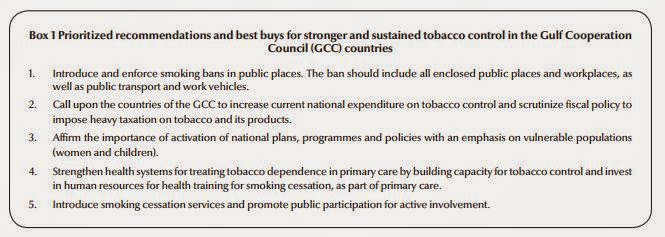A paper published in the Eastern Mediterranean Health Journal reviews the current state of tobacco use, governance and national commitment for control, and current intervention frameworks in place to reduce the use of tobacco among the populations of the Gulf Cooperation Council (GCC) member states and Yemen. It further reviews structured policy-oriented interventions (in line with the MPOWER package of 6 evidence-based tobacco control measures) that represent government actions to strengthen, implement and manage tobacco control programmes and to address the growing epidemic of tobacco use.
The findings of the review show that tobacco control in the GCC countries has witnessed real progress over the past decades. These are still early days but they indicate steps in the right direction. Future investment in implementation and enforcement of the Framework Convention on Tobacco Control, production of robust tobacco control legislation and the establishment of universally available tobacco cessation services are essential to sustain and strengthen tobacco control in the GCC region.
The findings of the review show that tobacco control in the GCC countries has witnessed real progress over the past decades. These are still early days but they indicate steps in the right direction. Future investment in implementation and enforcement of the Framework Convention on Tobacco Control, production of robust tobacco control legislation and the establishment of universally available tobacco cessation services are essential to sustain and strengthen tobacco control in the GCC region.

Comments